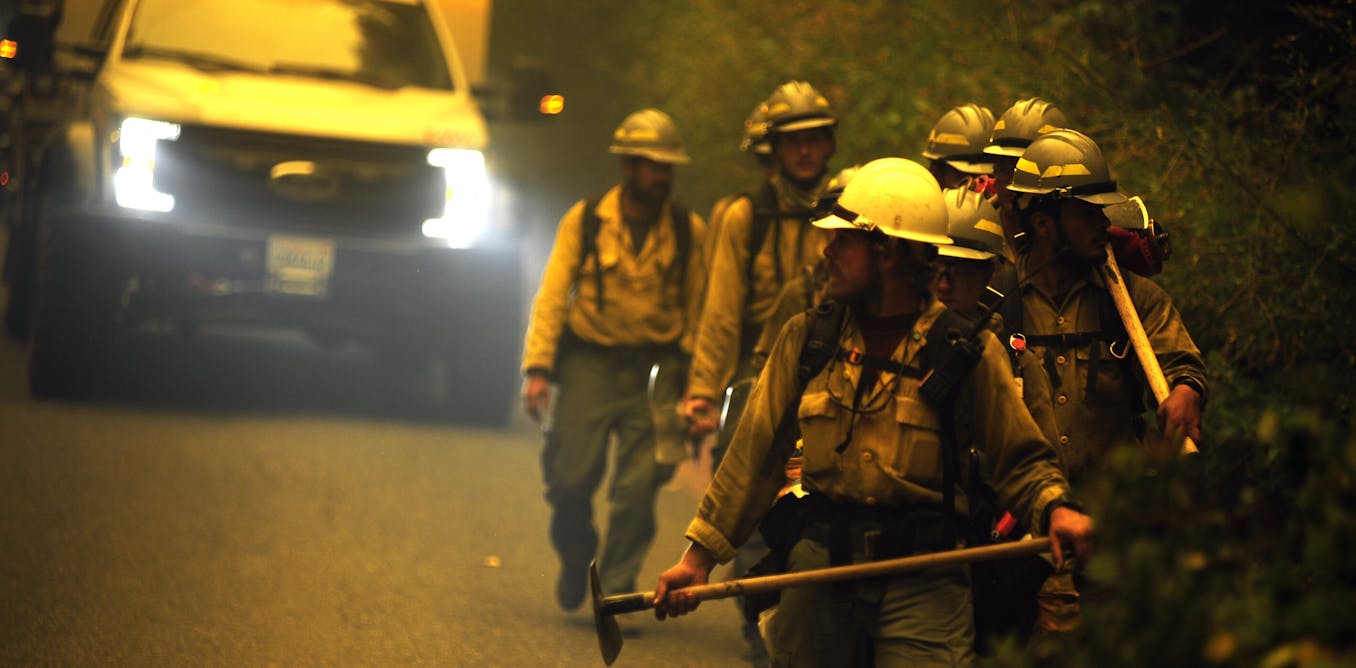Wildland firefighters face a big pay cut


Wildland Firefighters Face Uncertainty and Stress
As cool weather arrives and the number of U.S. wildfires declines, wildland firefighters who have spent months working in the heat and smoke are able to take a much-needed break. But for many of them, the stress of the job isn’t going away.
Continued uncertainty regarding federal pay and benefits, coupled with mental health risks and seasonal financial strain, make this a precarious time for wildland firefighters.
Pay Policies Encourage Overwork and Risky Choices
The federal wildland fire system also incentivizes overworking and risky behaviors that put firefighters at greater risk of physical harm.
With starting pay so low, many wildland firefighters end up working an average of over 600 hours of overtime annually to pay their bills. This is the equivalent of working 15 additional 40-hour weeks per year.
Surveys Reflect Mental and Physical Health Strain
In 2022 and 2023, my research team and I conducted national-scale surveys of wildland firefighters and the dispatchers who work with them. We wanted to understand how the high health risk factors, work-life balance and morale affect their well-being and future in the field.
Working in wildland firefighting is an unpredictable and often emotionally challenging job. Wildland firefighters work in tight-knit crews that depend on one another for physical safety, and they are the front-line defense for homes and communities threatened by fire.
Federal Hiring System Adds More Stress
A career in wildland firefighting can be a tough sell – long hours, months away from home, grueling physical labor, health and safety hazards, and low starting pay.
Surveys of wildland firefighters’ spouses and partners found high levels of family conflict and poor work-life balance. Most wildland firefighters said that they were unable to attend important family and life events during fire season, and most wildland fire dispatchers reported that they did not spend adequate time outdoors or with family.
What Congress Can Do to Retain Firefighters
My husband loves his job. He is proud of the work he does and the difference he makes by protecting lives and communities from wildfires. However, the risks to his health and well-being, the low pay and the pervasive stressful uncertainty of the future of the profession mean that exploring alternatives is a necessity.
Retaining experienced firefighters amid longer and worsening fire seasons will require policymakers to improve health care, pay and the organizational structure itself, including how firefighters are hired and retained. Yet, the federal government continues to delay taking action, leaving our nation’s fire-prone communities and wildland firefighters in a precarious and uncertain position.
Conclusion
Wildland firefighters are a vital part of our country’s emergency response system, and their work is critical to protecting lives and communities from wildfires. However, the stress and uncertainty they face due to federal pay and benefits, mental health risks, and seasonal financial strain are taking a toll on their well-being and future in the field. It is imperative that policymakers take action to address these issues and provide a more stable and supportive environment for wildland firefighters.
FAQs
Q: What is the current situation for wildland firefighters in the United States?
A: Wildland firefighters are facing uncertainty regarding federal pay and benefits, mental health risks, and seasonal financial strain, which is taking a toll on their well-being and future in the field.
Q: Why are wildland firefighters overworked and underpaid?
A: Wildland firefighters are overworked due to the low starting pay, which encourages them to work long hours and overtime to pay their bills. This is exacerbated by the fact that many federal firefighters are temporary seasonal employees, who need to reapply for positions every year.
Q: What can be done to improve the situation for wildland firefighters?
A: Policymakers can improve health care, pay, and the organizational structure itself, including how firefighters are hired and retained. This will require a more stable and supportive environment for wildland firefighters.
Q: Why is it important to retain experienced firefighters?
A: Retaining experienced firefighters is crucial amid longer and worsening fire seasons. Losing experienced firefighters will compromise the ability of wildland firefighting crews to effectively respond to emergencies and protect lives and communities.
Recent Posts
Cardio and Strength Training Boost Health as You Age, Balance Exercises Reduce Falls
Why Balance Training is Crucial for Older Adults We all recognize the benefits of regular…
Grip Was a Nonfactor
Hatton's Arnold Classic Training Lucas Hatton, a two-time America's Strongest Man, shared his preparation for…
HIV vs. AIDS: How They Differ and Why Early Treatment Matters
How HIV and AIDS Differ The main difference between HIV and AIDS is that HIV…
The pandemic badly affected young people’s mental health – but also showed what they need now to thrive
The Teenage Years: A Time of Turmoil and Crisis A New Perspective on Adolescence The…
Taylor Atwood’s Squat Training 4 Weeks out From Powerlifting Nationals
Taylor Atwood on Track for Big Performance Taylor Atwood is considered one of the best…
Are Nicotine Pouches the Best Way to Quit Smoking?
Nicotine Pouches: A New Way to Quit Smoking? Nicotine Replacement Therapy Nicotine replacement therapy (NRT)…


